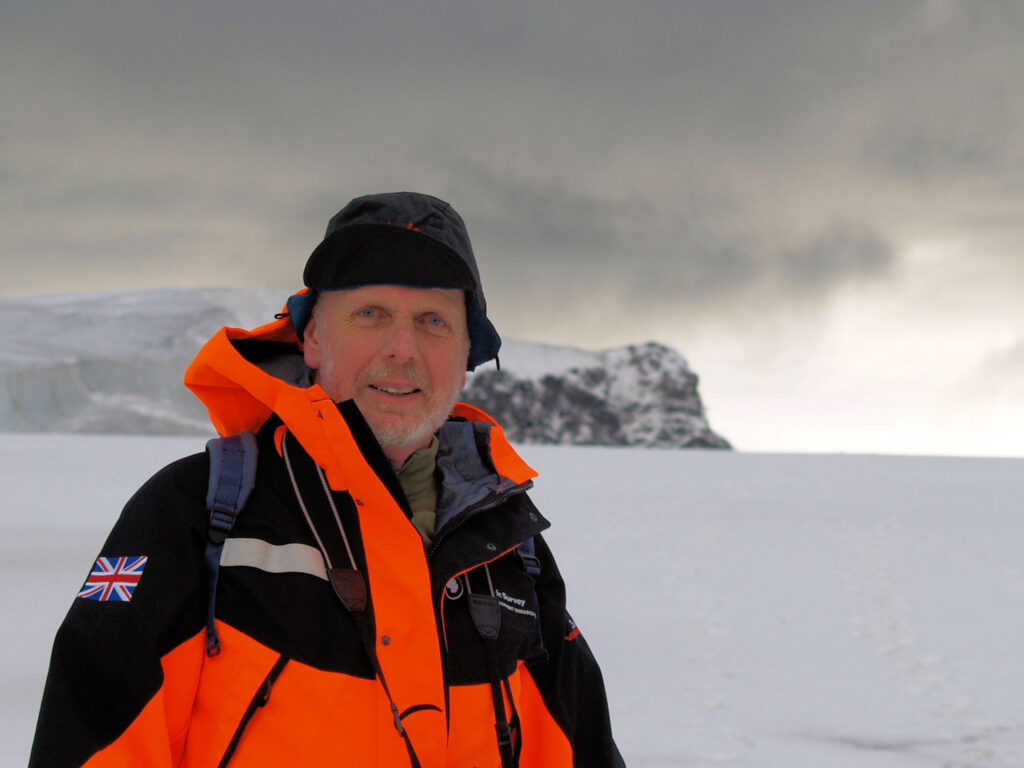Professor Paul Rodhouse is an Emeritus Fellow at the British Antarctic Survey (BAS). He has been a Member of the Marine Biological Association (MBA) for fifty-one years and was made an MBA Fellow in 2020.

His early research in Southampton, Galway and New York was concerned with physiological ecology and carbon flux in marine bivalves.
He later joined BAS where, in collaboration with Malcom Clarke FRS at the MBA, he developed a research programme on the role of squid in the Southern Ocean ecosystem.
He also pioneered the use of US Defense Meteorological Satellite Programme imagery to study the spatial dynamics of fishing fleets.
For ten years he was head of Biological Sciences at BAS and a member of the BAS board.
He was Principal Scientist for the South Georgia Government Fisheries Laboratory at King Edward Point from 2001-2013. He retired in 2013 and is still an active marine biologist.
Professor Rodhouse reminiscences about becoming an MBA Member, and his exciting journey as a marine biologist.
“By 1973 I had a degree in biological sciences, including courses in marine zoology and botany from London University (Westfield College) and a masters in oceanography from Southampton. I was now starting a PhD at Southampton on oyster energetics so, with a sense that I might have a career in marine biology ahead of me, it was time to become a Member of the Marine Biological Association.
I wrote my application, signed the cheque (as you did in those days) and soon my Membership card arrived along with the four 1972 issues of the Journal of the of the Marine Association UK (JMBA) to get my collection off to a good start.
At the end of 1976 I completed my PhD which charted the lifetime energy budget of an individual native oyster (Ostrea edulis) and, based on a survey of the beds of mature oysters in the Beaulieu estuary, energy flux through the whole population.
It was my dream to work at the MBA in Plymouth, but my first job turned out to be at the new Shellfish Research Laboratory in Galway, western Ireland. Funded by the National Board for Science and Technology, the lab was managed by the University College Galway Zoology Department.
I spent nearly six years there, mostly leading a team to produce a carbon budget for Killary Harbour, a small west of Ireland fjord. The data were used to estimate the carrying capacity of the system for mussel culture so that failures due to overstocking experienced by scallop farmers in Japan might be avoided. We published several papers, mostly in the JMBA, but the 1981 economic recession hit Ireland hard and I, plus the other five prime movers at the lab, were given redundancy notices.
In the circumstances I was lucky to land a research associate position in the Ecology and Evolution Department at Stony Brook University, New York. This was to research the relationship between physiological energetics in marine bivalves and multiple locus heterozygosity, which was a hot topic at the time. I worked with a group of terrific colleagues in a dynamic department and have fond memories of the American way of life.
Then in 1984 I spotted an advertisement in New Scientist for a squid biologist at the British Antarctic Survey. Well, squid are molluscs and the intriguing prospect of tackling such an exciting topic, in the Antarctic, was worth a shot, so I applied.
By a fortunate coincidence I was travelling to the UK for the 1984 EMBS symposium in Plymouth which was marking the Marine Biological Association’s centenary, and I was offered an interview at BAS a week later.
I met some of the BAS interview board at the symposium, including Malcolm Clarke FRS at the MBA, who was advising BAS on squid biology. I spent the whole week before the interview researching Antarctic, and other, squid literature and then travelled to Cambridge where I was given a medical after the interview and was offered the job.
Not only that but I was asked whether I would be prepared to spend my first year with BAS at the MBA serving an ‘apprenticeship’ in squid research with Malcolm. I was certainly prepared and delighted to have this opportunity!
It was a great year which I thoroughly enjoyed and I learnt so much as I switched my focus from bivalves to cephalopods. Malcolm also arranged for me to join a deep-sea fish cruise out of Oban in RRS Challenger, which was excellent preparation for my subsequent cruises to the Southern Ocean in RRS John Biscoe and James Clark Ross.
I spent nearly thirty years at BAS, as a research scientist and later as head of Biological Sciences. In 2001 I became the principal scientist for the new applied fisheries research lab at King Edward Point, South Georgia, which replaced the military garrison that had maintained the UK presence there since the end of the Falklands conflict in 1982.
By this time the JMBA was online, so I donated my 30 years run of the Journal to the new station’s library.
I retired from BAS in 2013 and was made a BAS emeritus fellow. In 2020 I successfully applied to upgrade my MBA Membership to become a Fellow.
I am still actively involved in marine biology and this year, fifty-one years after becoming a Member of the MBA, I had a book: ‘Antarctic whaling: a case study in near extinction’, published with two co-authors, John Sheail and John Dudeney.”
Professor Paul G. K. Rodhouse DSc FMBA
Become an MBA Member
For more information about MBA Membership and become a Member today, please visit our webpage or contact the Membership team at membership@mba.ac.uk.